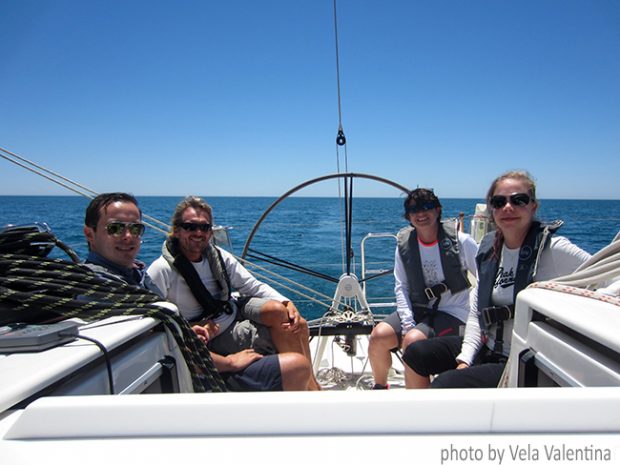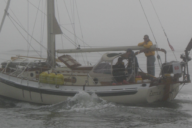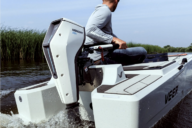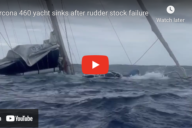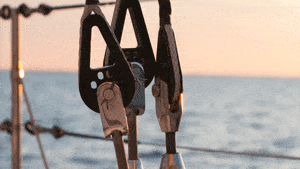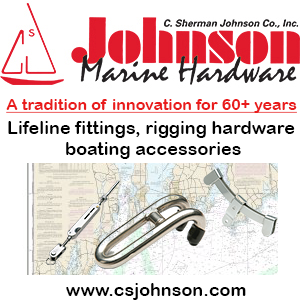Back in April, I wrote a Just Cruising column asking the simple question, “Should sailors be certified?” We got a ton of response from CC readers. Last week, Scuttlebutt picked up the column and re-published it, with my email address attached. Well, sailors have a lot to say on the subject and here are some of the responses we got this week. GD
George, you must be kidding. Sailing is one of the few remaining activities open to everyone. There are many aspects of sailing that can be accomplished in more than one way – yet each may be correct. Learning by experience is valuable in development of thinking skills in people of all ages, but especially in young people. Requiring certification would remove much of this opportunity, and further raise the price of entry into our sport.
Classes are an excellent idea for those who desire them. Charter and insurance companies that require or simply reward those who take courses in various aspects of sailing may do so, of course. Requiring a course simply gratifies those would-be gurus that would tell us all how to do everything! The last thing we need are more “experts”.
I taught myself the basics of sailing as a youth then left the sport for 20 years. Later my son did attend our club sailing school as an 8 year old and then sailed with us to NZ and return, a formative two and a half year event for each of us. My wife and I have two such trips to NZ under our belts, and that was before GPS. (Yes, I did on-the-job training for celestial navigation as well.) Later in life, we still day-sail regularly.
Don’t take the opportunity for learning self-reliance away from sailing.
Tom Hill
George
I think this is a great topic. Have been sailing all my life and I feel very privileged to have experienced fantastic adventures, different countries visited by seaports, the experience to cross the oceans, to introduce my kids to the sport of sailing and to invite non sailors the opportunity to share in my experiences. There truly is no life like it. We as sailors have been blessed.
My concern is sailing as a sport is dying. My wife and I just spent last winter sailing in the BVI Virgins Islands. I was appalled with the people who charter boats, catamarans (which I don’t even consider a boat.) They never put up a sail because they have no idea how to sail. They just motor. The disasters we witnessed are unbelievable, and we were hit twice in our boat both times while alongside at a dock. Seamanship has gone by the wayside. Racing is the new professional yardstick, and the false sense that if you race, you are a sailor.
I have watched Junior Sailing programs here in Canada. It is the blind teaching the blind. It’s all about racing and nothing about seamanship. Most of the instructors have never sailed any distance and the only reason they are instructors is because their parents are on the Board of Directors at the club.
Sadly, in Canada, government regulations have taken over sailing programs and theory prevails and not practical experience. Everything is taught by the book, and again experience doesn’t seem to come into the equation. No wonder people who go out after taking a sailing course are scared to death when the wind starts to blow. and if you ever want to take the “Maritime Restricted Operator’s Certificate” in Canada, put out by Industry Canada, well you will understand how sad our programs are. You can even take the course on-line so you can cheat.
Its easy to sail, its entirely different when things go wrong. Seamanship is what we need to certified.
Regards
Jock Macrae
George,
I just read your article in Scuttlebut. Great read!!! I am by trade a professional mariner licensed by the USCG with an unlimited 3rd mate and a 1600 master, long and short is I have about every certification I can get except sailing, that being said, I used to hold a US Sailing instructor certificate and presently race a Prindle 19 beach cat.
I say all that to say this. I dont think making things mandatory would help situations out any. As a towboat captain I see some of the most ridiculous, crazy, brainless stuff you can imagine, both by licensed and unlicensed mariners. In Texas we have a requirement to take boaters education for all motor vessel operators born after a certain date and all PwC operators regardless. At present there is no requirement for sailing vessels.
Mandating licenses or certification to some degree becomes a money grab for the state doing the licensing. For instance, look at the drivers licensing in Texas, Houston to be specific where I live. There is a total disregard for all rules of the road and almost a lawlessness to go with it. Has requiring a driver’s license helped? Not a bit, I feel on the water would be no different. I see it all the time especially with PwC operators who seem to have a total disregard for all rules of the road and etiquette, that is not all of them but a large majority. Just 2 days ago there were 3 killed and 4 injured in a massive crash up on Lake Conroe north of Houston where a large ski boat ran over a bass boat that was under way not making way, I don’t know the rest of the details but both boats surely had to have taken Texas’ boater education. We can’t go a weekend in the summer over here without hearing stories of boaters having incidents on the water ways. Even licensed mariners are part of that culture. I can’t understand how somebody that passes a USCG licensing exam that includes rules of the road can’t abide by them or even understand them, but I digress.
I wish my boater’s insurance would take into account my masters certification, it sure would be nice. In closing, I don’t think the state should mandate something of the sort. I feel that it should be up to the insurance provider to stipulate the conditions of insurance, or the rental agency. Would it help if maybe it were voluntary? Probably not. Would a break on discount rates be nice, sure would.
Captain Chris Holley
Relief Captain M/V Bill English
Hi George;
I would like to offer a few of my own thoughts. I try to rationalize issues such as this using logic, based on the likelihood of occurrence of a problem multiplied by the severity of that problem, in the same way risks are assessed in the engineering world. Applying this process to skippering your own boat without a certificate, an incident could be catastrophic (or not), but is unlikely to happen in most cases, as the vast majority of people have enough common sense not to attempt anything too adventurous until they feel they have accumulated enough knowledge and experience to do so.
There will always be a number of boating incidents every year, as nothing is risk free, but without proper data on the level of formal certification of the skippers involved and whether lack of training contributed to the incidents, mapped to the nature and outcome of the incidents, it is impossible to quantify the real value of certification.
On the other hand, everyone has the ability to learn something through formal training no matter how experienced they are. My point is merely, ‘would certification make a quantifiable and worthwhile reduction in the risk of skippering a boat to the extent that we would see a marked reduction in loss of life, emergency rescues and insurance claims?’
I personally feel the answer is that it probably would not and that insistence of certification would merely be another source of income for the maritime authorities and schools.
It is tempting to insist on certification as a must-have without first assessing the real value of it, however, in the bureaucratic culture that prevails today, there will always be a cohort of risk averse people ready to criticize anyone who dares to say certification is not necessary.
Your article was very interesting and indeed thought provoking.
Regards, Cara Fowler
Hi George,
As a licensed captain and ASA Sailing Instructor, I would say the answer is more convoluted than a yes or no. I’ve found experience is more valuable than some stamp in a logbook. An “honest” sailing resume has more weight to me than a Bareboat Charter Certification from a sailing school.
However, I do believe that someone operating a boat of any kind should take a boat safety class and understand the Navigation Rules before taking the helm, but especially a sailboat where danger lurks just above your head. On a recent charter my mainsheet shackle attached to the traveler broke and the boom swung wildly to leeward. After their initial shock, my passengers then looked at me and said “Now I understand why you instructed us to only travel on the high side(windward) when moving forward and back.”
Captain Keith
New Jersey Sailing Center LLC
George,
I liked your short query article on certification, and especially the idea of a insurance break for those with certification. I don’t think a certificate of competency should be required on a boat, but I would welcome an actual boating course of some sort (powerboaters, especially, don’t seem to know the rule of the road or the basics of the COLREGS).
I do have an ASA 104 certification, and I wouldn’t have wanted to charter without it (I simply felt more competent, and I’m sure my charter company was not displeased to know that their boat was in competent hands), But I also like the idea of qualification by sailing resume. As you mentioned there are many good sailors out there who don’t have certification but tons of experience and a lot of sea miles under their belt. I don’t think they should be excluded from chartering.
One quick note on a question you posed: A certificate of competency does not allow someone to sail for hire or carry passengers. That’s an actual captain’s license from (in our case) the USCG. It is so much more involved than the ICC (or equivalent).
The certificate of competency (ICC), by the way, can only be issued by a national sailing body from a country that is the signatory of the UN Resolution 40. The US is not such a signatory (which includes most of Europe and South Africa). The ASA, however, offers an International Proficiency Certificate (which can be requested for a fee upon completion of the ASA 104-Bareboat Certification). It’s not exactly the same thing, and it may or may not be accepted as the equivalent of the ICC (depending on the charter company).
Wayne
Sounds like there is a dollar to be made, George.
If someone passed legislation requiring a certificate how many people would be compelled to enroll in sailing school? What a boom for the industry that would be. I don’t presume a sailor could pass a competency test to get the certificate. I’m sure they would have to attend the weekend-long class and fork over the tuition no matter what their level of experience and knowledge.
In my experience most new legislation makes money for someone and are typically supported by the people who will make the money. I’m sure that sounds jaded but this one sure feels like a money grab to me.
Rob Edgcombe
Dear Mr. Day,
I’ve run a business certifying sailors, first with ASA, then with US Sailing, for 35 years. Now 5 years retired, I’m a volunteer leader for US Sailing, on the board of directors. Part of my role is in trying to make sailing ‘stickier’ for youth and adult sailors. I have some miscellaneous comments for you to sift through in case they prove helpful. I realize some are tangent to your request, so apologies in advance.
As you say, You need proof of proficiency to captain a vessel in the Med (in most countries. The European Union has decreed that all sailors in EU waters possess ‘proof’ of competency to increase safety and reduce the pressure on emergency services. So, charter companies require it, but only to comply with the EU’s administering of UN 40. (of which the US is not a signatory).
US Sailing offers an International Proficiency Certificate to those sailors who’ve earned their Bareboat Cruising Certification, which has been accepted by European charter companies since its creation in the early part of the 2000s. It costs $25.
To sort of answer your question: Every sailor I know, from my most grizzled instructors and cruisers to race competitors and elite sailors, will learn something valuable just going through the evaluation process without any formal training. There are lots of ‘best practices’ and little known regulations that have failed to surface during the ‘sailing as much as I can while learning from others’ stage of most sailors’ lives. So, in my opinion, formal skills and knowledge certification is valuable for everyone. An experienced and skilled sailor will pass almost every time and the process is about an hour of written exams and two hours OTW with a certified instructor. AND, will learn a ton in the process. Little things, like the granular details of a proper return to a person in water in a variety of conditions or type of vessel, for instance. (75% of experienced sailors have never bothered to perform an MOB drill, other than retrieving a hat) All that said, I’m careful to avoid the word ‘should’ as often the road to damnation is paved with those good intentions. But, there’s more value in the exercise than just having a card or logbook, or being able to captain a boat in France or Greece or Croatia.
My experience, having examined hundreds of experienced sailors for instructor positions or to provide them with the Bareboat Cruising Certification via challenge evaluation, is that most experienced amateur sailors have developed a perception of their own skills that may or may not be accurate or previously evaluated, but is closely held. The more years under one’s belt, the more closely held that view. When I evaluate professionals (charter captains, practicing instructors) I see much less of that as they’ve already had to demonstrate skills and knowledge and have already filled most of the holes in their skills and knowledge.
Now for some landscape (that’s code for things I’d like you to know that you didn’t ask about!):
America has chosen a different path from the EU, choosing to avoid a full examination of a boater’s competency (skill and knowledge). However, the ‘knowledge’ standard you referenced, created by NASBLA (National Association of State Boating Law Administrators) is a middle ground. These state ‘boater’s education’ requirements are a simple, inexpensive way for boaters to gain some of the safety and regulatory knowledge that makes them (and other boaters) safer on the water. These are classroom or online knowledge based courses. There are even some online courses provided at little or no expense. Their popularity with those 42 states stems from the fact they are a big boating safety bang for the buck as the states’ only expense is oversight and standards updating.
NASBLA and the USCG Boating Safety office point to this boater education as well as public initiatives promoting life jacket wear and discouraging boating under the influence (also, improvements in vessel construction and the advent of GPS, of course)contributing to the drop of boating deaths from around 2000 annually in the early 70s to under 700 a year now, even though boating hours have dramatically increased from those days.
Now, the USCG Boating Safety Office has created a series of grants to standardize on water skills training, not to step toward licensing of boaters but to avoid the need. The National On-Water Standard, (NOWS) was created by scores of subject matter experts in three disciplines – Sail, Power and Human Powered. This set of standards is in tool-kit format, helping boating safety schools build and maintain their curriculums in a way that promotes joy of boating as well as competency and safety. More information can be found at www.usnows.org .
Since formal training was instituted nationally, US Sailing’s small boat training scheme from early 80’s, ASA’s keelboat scheme in mid 80’s and US Sailing’s keelboat scheme in mid 90’s, sailing’s accident, injury and death statistics have steadily declined faster than those of power boating or human powered craft (canoes, kayaks, rowboats).
Again, apologies for the info you didn’t ask for!
Richard Jepsen

